Just Transition at COP 28: How much progress was actually made?
How well did just transition fare at COP 28? Were there any breakthroughs? We take...
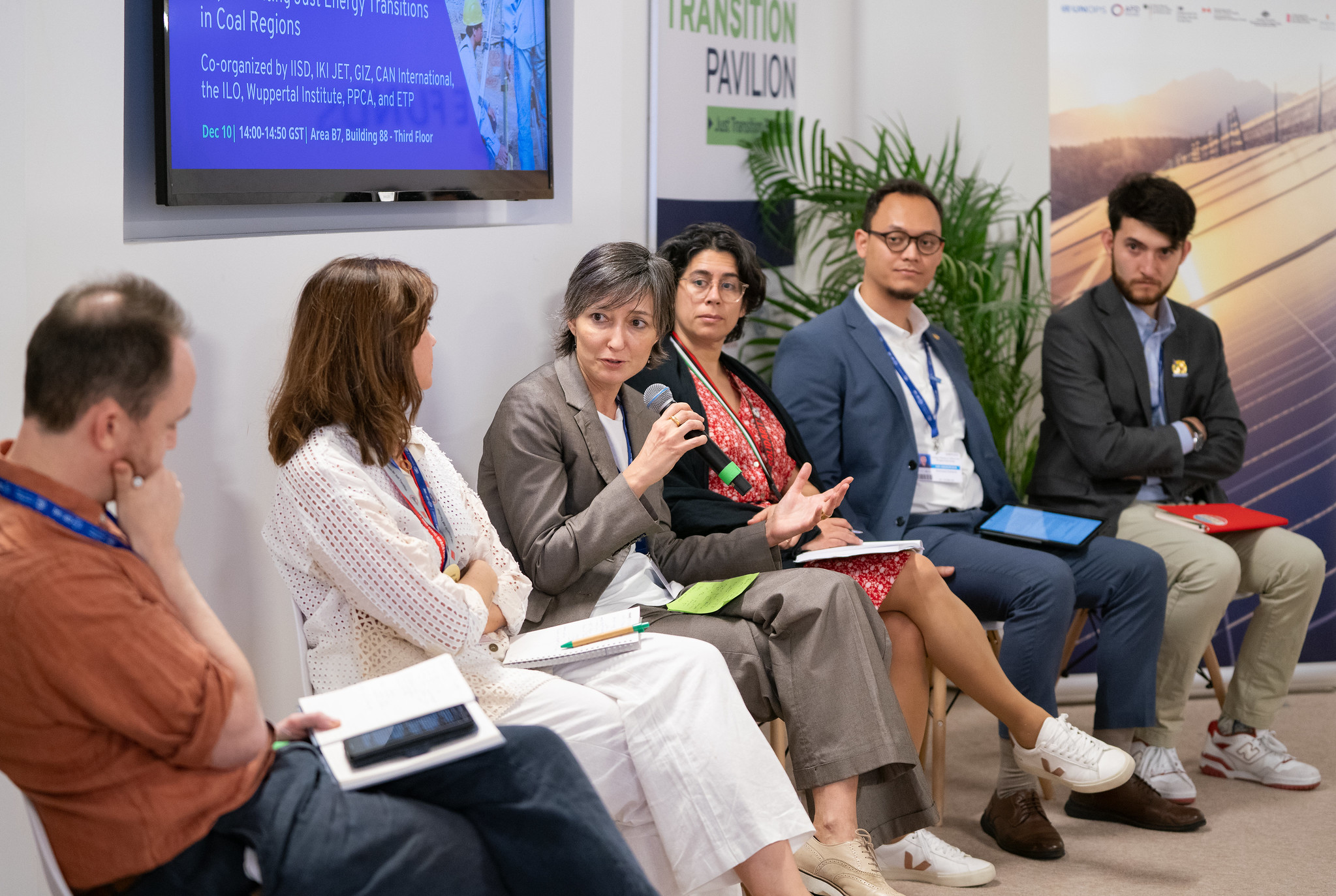
On December 10, representatives from civil society, trade unions, international organisations, and governments gathered at the Just Transition Pavilion at the 28th UN Climate Change Conference (COP 28) in Dubai to discuss the importance of partnerships and international collaboration in facilitating just transitions in coal regions, with a particular focus on Colombia and Indonesia.
Opening remarks were provided by representatives from the German government and the European Commission, as donors of the Innovation Regions for a Just Energy Transition (IKI JET) project, with the discussion led by Chris Beaton, Director, Energy Program, International Institute for Sustainable Development (IISD). The Just Energy Transition in Coal Regions Knowledge Hub, a new platform that seeks to support knowledge exchange between coal regions for this very purpose, was presented by Jonas Kuehl, Policy Analyst at IISD.
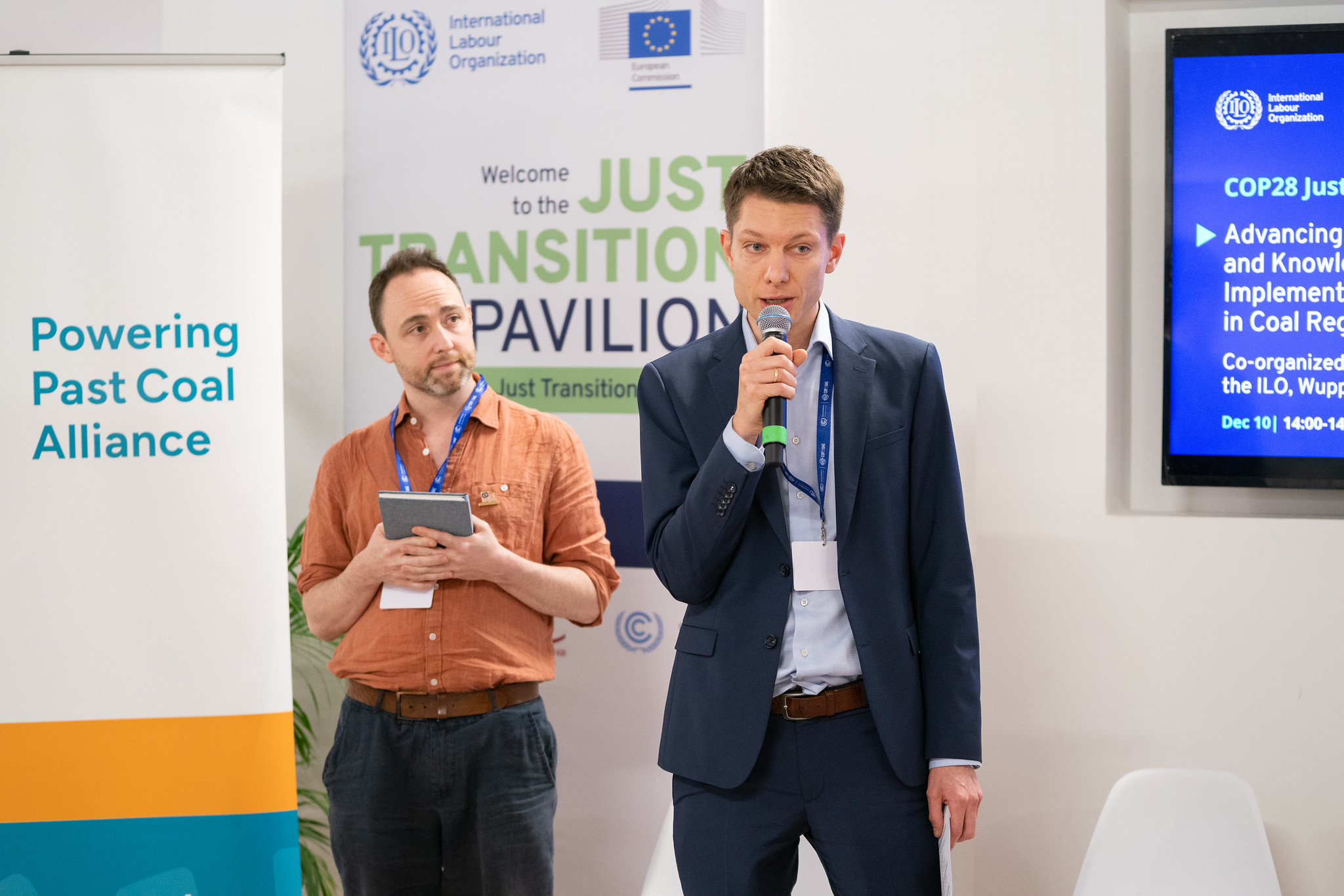

Dr. Lutz Morgenstern Head of Division, Federal Ministry for Economic Affairs and Climate Action (BMWK), Germany:
“In order to manage the transition we face, we have to involve trade unions, companies, academia, civil society. Otherwise, it will not be fair, transparent, inclusive, or just. I can relate to this on a personal level, as my grandfather was a coal miner and a proud unionist. My mother was raised on a coal salary. Nowadays, the city where they lived has become an ‘innovation city,’ where money has been invested in new enterprises after the coal mines closed in the 1990s. Consequently, the transition was largely successful.
International cooperation is also vital in this field. We are really proud to fund the IKI JET project that supports coal regions around the world and assists them in forming a global community of practice. In addition, Germany works with more than 90 countries across all aspects of the transition away from fossil fuels towards renewable energy via the International Climate Initiative (IKI).”
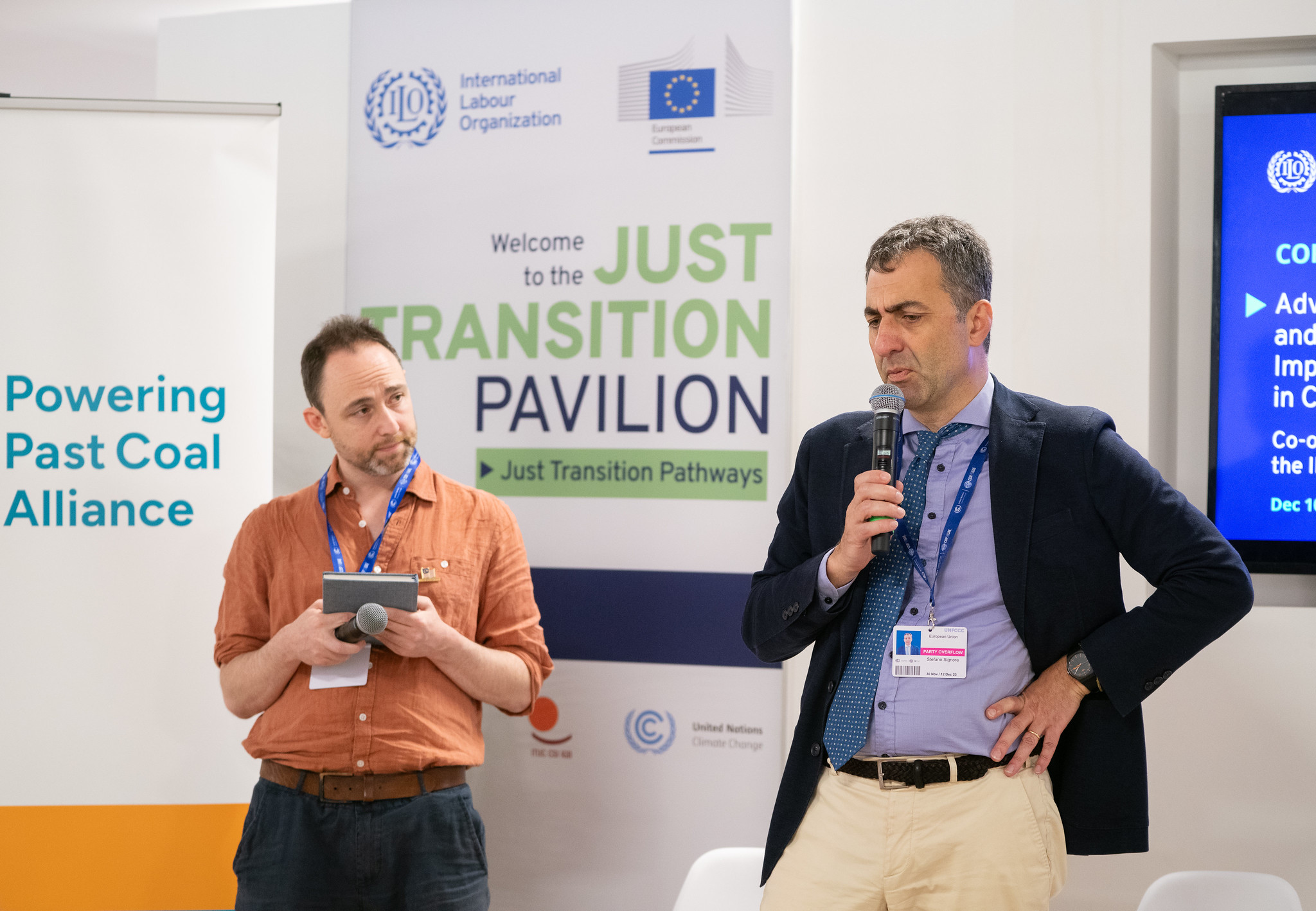

Stefano Signore Head of Unit, Directorate-General for International Partnerships. Unit F.1 – Climate Change and Sustainable Energy; Nuclear Safety, European Commission:
“When we talk about energy transition, we need to focus on two elements: The first is the role of coal, the second is the ‘just’ element. It remains hard to crack the role of coal in electricity production and industrial processes, but it is crucial that this happens. In terms of the just element, there are communities and regions around the world that are reliant on coal production and extraction. We saw the same in Europe, and we put in place a just transition mechanism to help those regions move away from coal and invest in decarbonisation. We want to do the same with our external cooperations. We are very involved in Just Energy Transition Partnerships (JETPs), for example, where we support communities with reskilling to facilitate a move towards greener energy systems in South Africa.”
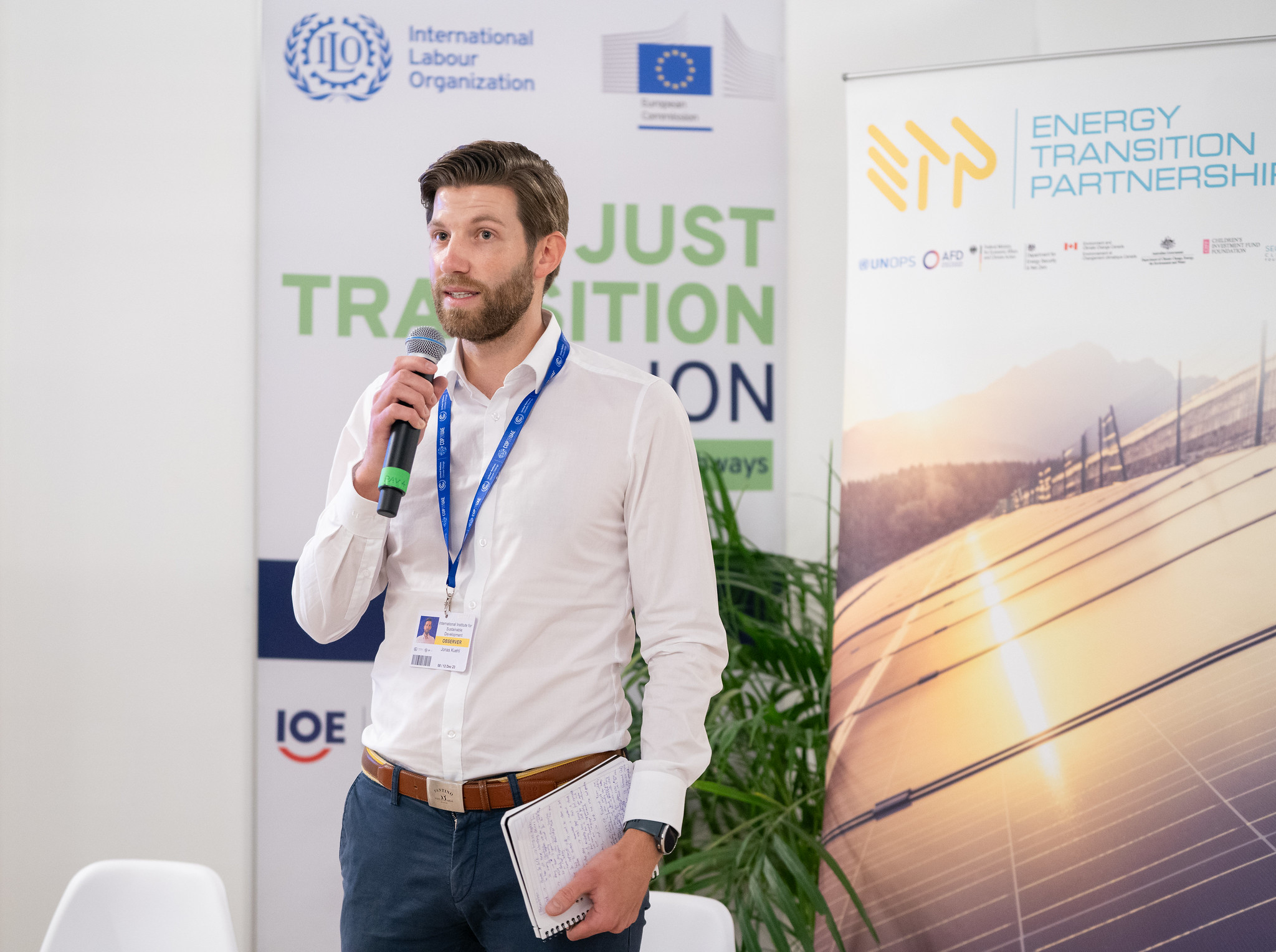

Jonas Kuehl Policy Analyst, IISD:
“We know there is a lot of knowledge out there on just transition, but that this knowledge is very scattered. The Just Energy Transition in Coal Regions Knowledge Hub serves as place where people can find this kind of knowledge. We see this platform as a way to build bridges between all the stakeholders who need to be involved in a just energy transition: trade unions, civil society, government, researchers, the coal industry. We want to share the real stories—not just best practice but lessons learned—and collate effective tools that will allow us to implement just energy transitions. It will be a comprehensive platform looking at specific countries and coal regions—for example, Colombia and Southeast Asia—but we also aim to make it inclusive and a repository for global news.
We aim to include deep dives on topical themes, commentaries, and blog posts on top of long academic reports to make information on the Hub digestible and accessible for a wide audience. There will also be a focus on bringing key just transition events to the global community. Overall, we want this to be about two-way communication: we welcome contributions from experts, stakeholders, and we want to hear if there are any knowledge gaps.”
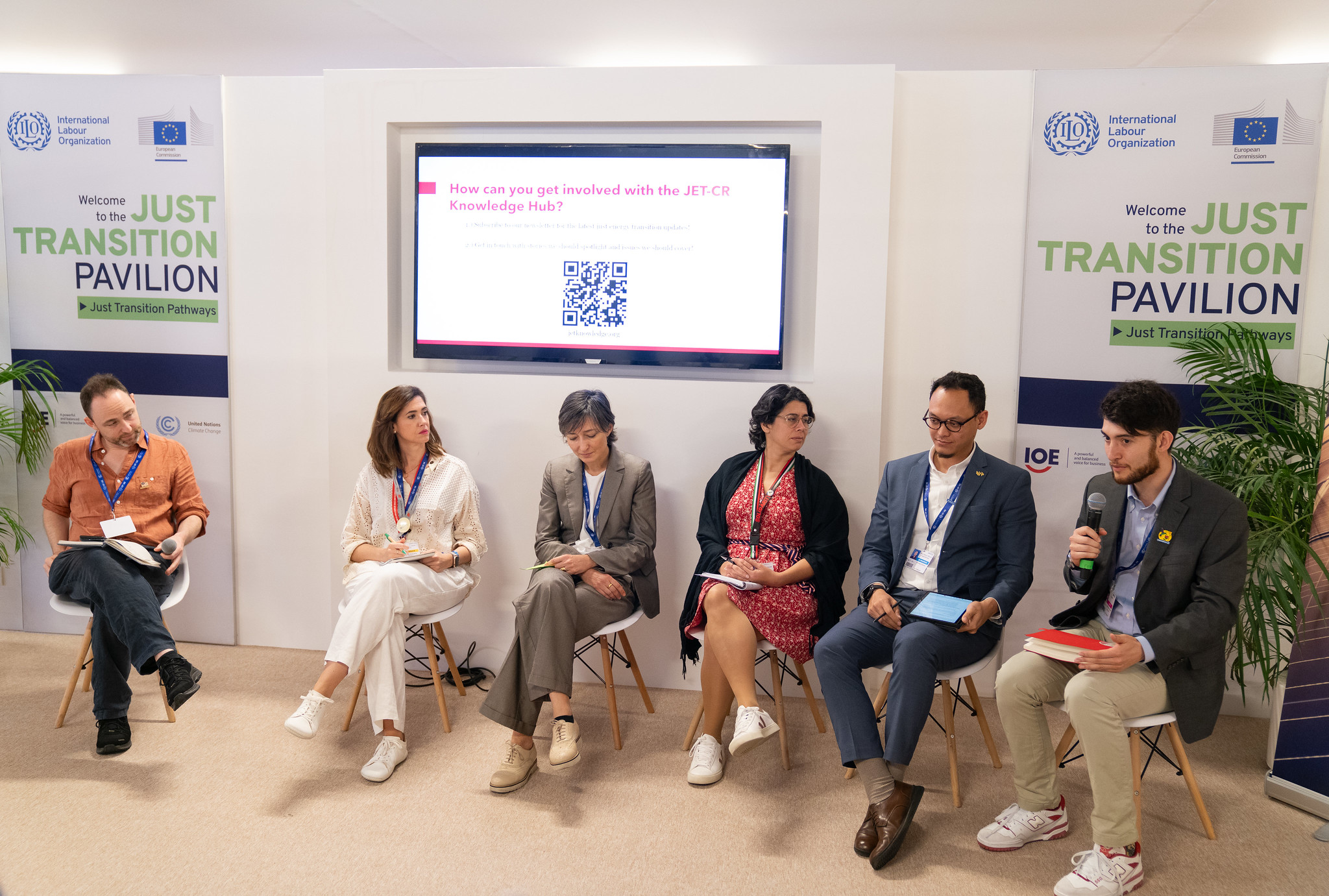

Felipe Corral Advisor for JET Unit, Ministry of Energy and Mines, Colombia:
Q: Why is just transition so important for Colombia? What brought about this collaboration with the German government and the EU, but also the exchange with countries in the Global South? And what concrete outcomes would you like to see?
“Colombia has a unique situation when it comes to coal, as we export more than we consume, which raises the question of which elements of the energy transition we control and which we don’t. For example, when we talk about collaboration with international partners, we cannot forget that the EU and many Latin American countries have purchased a lot of Colombian coal but are now reducing their consumption, thus creating a difficult situation in Colombia. We have no control over the pace of this, but the hasty economic transition has so far happened more by disaster than by design. A central theme on which we want to collaborate is therefore economic diversification, to support not just direct coal mine employees but indirect employees that are affected. A concrete aspect we want to focus on is how to leverage the little revenues collected from coal royalties in the last few years and how to channel it towards the transition in these regions.
The other dimension relates to the coal we do consume in Colombia. We are working with GIZ and the EU to phase out coal-fired power plants and manage the just transition of labour-intensive mining activities. This is all about exchanging experiences and tools on how to work with workers, especially in the informal economy. Something that is extremely important for us is to intensify not only the planning phase—what the just transition could look like—but also stakeholder engagement and participation, in particular investment and actions. We want people to feel reflected in these decisions and investments, because the transition should be an opportunity for them, rather than a challenge.”
Camilla Roman Policy Specialist, Green Jobs Programme, International Labour Organization (ILO):
Q: What role do you see for cooperation and partnerships in just transition? How does ILO support just transition globally?
“Firstly, just transition is essential to climate goals. Just transition is a key enabler and a key condition for ambitious climate action, but we won’t get ambitious climate action unless the transition is just.
That’s why it’s essential to take action at the country level, so that we can move at speed and at scale in order to deliver. The ILO has published its just transition guidelines, endorsed by 187 member states, governments, trade unions, and employer organisations, which outline key guiding principles and policy entry points to bring about a just transition, with explicit reference to stakeholder engagement processes, communities, and groups such as Indigenous People. The guidelines also recognise the role of international cooperation, and the ILO is very active in providing technical assistance to developing countries and emerging economies in just transition policy-making. We focus a lot on policy coherence, and the first entry point is to integrate decent work considerations into NDCs [nationally determined contributions], for which Colombia is a good example.
Turning to implementation, there are skills development strategies, economic diversification, and social protection as thematic instruments. The notion of a just transition is about maximising positive economic, social, and employment outcomes of the green transition while minimising negative impacts. A key aspect of our technical assistance to partner countries is social dialogue and stakeholder engagement because it’s not just the outcome we should be looking at—only when the processes are inclusive and fair can the outcomes be just. Sometimes in technical cooperations, there is some frustration if there is a lot of dialogue, but dialogue is a critical component in delivering a just transition at the national and subnational levels.
Cooperation, not just with our partner countries but also with international partners, is essential. Just transition is a very complex and broad topic that requires a whole-of-society and whole-of-government approach. Through this consortium where we work and implement together, we can leverage sets of comparative technical expertise, and our networks can bring together a wide range of stakeholders to provide comprehensive technical assistance to countries. We are very pleased to have this project and to be able to localise the just transition guidelines and turn them into a reality that works for the countries and the coal regions we’re supporting.”
Diana Junquera Curiel Acting Director, ITUC Just Transition Centre and Energy Industry and Just Transition Director, IndustriALL Global Union:
Q: What does meaningful engagement of workers look like in practice? And what can international cooperation do to facilitate that?
“The ILO just transition guidelines give us the framework that allows us to work together with governments and employers to bring workers to the table. For us, this project is extremely important. It’s where we can bring in workers’ voices, not just from the national context but also the international one, and where we can share experiences and information that will be useful for them to acquire the skills they need. We also see this project as a tool to connect with our affiliates on the ground—the ones who are dealing with issues like the closure of coal mines on a day-to-day basis—and to coordinate with governments to show them that we, as workers, have a lot to say on the processes for just transition.
We want to bring together workers and communities in order to develop proper plans within specified time frames and budgets. Without money, none of this can happen, and we cannot bring new opportunities to these workers. Finally, it’s important to create committees for implementing these plans but also for following up, to assess the results. Because if we don’t measure progress through these committees, it’s impossible to know whether we are succeeding or failing. And if we’re failing, we need to be able to react to make things change.”
Anabella Rosemberg Senior Advisor on Just Transition, Climate Action Network (CAN) International:
Q: Why is civil society a key stakeholder for just transition? How can civil society benefit from collaboration and partnerhips, particularly in the Global South?
“There are two elements of the just transition that we are trying to bring to the conversation. Firstly, there is the element about development pathways. How can the economies that have grown through extractivism—in this case coal—transform? This element is also part of the ILO guidelines: macroeconomic policy and diversification are key to this conversation.
Secondly, how do we bring about a just transition that has people at its heart? Which means not just the workers who are directly and indirectly impacted, but also the surrounding communities that need to see themselves reflected in the pathways and visions we are charting for them. The fact is that communities right now don’t have the structure that the trade union movement has to be able to coordinate from the local to the national and the international levels in a united voice to ensure that some key elements, such as social dialogue and social protection of collective bargaining, are upheld.
Today, many communities are fortunate to have support from trade unions—unions are defending many communities and territorial interests—but in other places, this isn’t possible. This coal transition is not happening in a vacuum; it’s happening in places where rights are not respected, it’s happening in places like Vietnam where we have environmental defenders in jail, in Mongolia too. In these places, it is sometimes very difficult for trade unions to partner with communities seeking justice. Therefore it’s important that projects like this actively support, through international cooperation, the activation and organisation of the voices of those communities. CAN is humbled and proud to play this role within the consortium, which isn’t an easy one. Those communities, similar to trade unions, have been betrayed multiple times over the years—and don’t necessarily trust public institutions in their ability to deliver justice. All of the international institutions in this consortium are trying to rebuild trust in these institutions and their ability to deliver that justice. It’s very important that we find places, like in this consortium, where we can bring best practices, but also the challenging aspects of the transition and discuss them in a non-confrontational space, and figure out how we can build that social consensus that is critical for delivering on climate ambition. Because, in the end, there is no climate action or ambition possible if there is no social justice.
Projects like this help us elevate the expectations about this happening. However, we also need stronger governance of the just transition. We have some elements from the ILO guidelines but hope to get the minimum standards for just transition outlined by the UNFCCC [United Nations Framework Convention on Climate Change], as well as guidance on how international cooperation can be activated to support it in countries that have few resources. This consortium will push for that governance by placing a strong focus on rights, inclusion, social dialogue, protection of people, diversification, so that just transition is not just the latest buzzword with no deep meaning. We are trying to shape it in the making.”
Achmed Edianto Indonesia Country Coordinator, Energy Transition Partnership (ETP):
Q:What is the status of coal phase-out in Southeast Asia? And what do you see as the big challenges for the transition away from coal-based economies in the region? What is needed to bring these conversations on just transition to the mainstream to support coal communities?
“We have two perspectives: the first is commitment, the second is implementation. Having a commitment or ambition is one part, but implementation is something else. For Southeast Asia, of the 10 ASEAN [Association of Southeast Asian Nations] member states, there are seven countries that have already committed to achieving net-zero emissions between 2050 to 2060. At the same time, the region is also highly dependent on coal. For example, Indonesia is in the top three coal-producing countries in the world, and it still has 140 billion tonnes of coal reserves in the ground. Even though the coal Indonesia produces is mainly for export, the government is already aware that international demand will decline, and so their strategy had been to increase domestic demand. This demonstrates that coal transition is something that needs to be better understood in the region.
The second challenge is a lack of experience. Of course, in a region that has no experience of just transition, particularly related to coal, there is zero knowledge of how to implement it in a just way. During discussions with mining stakeholders, we have heard that challenges around coal transitions have already been felt due to boom and bust prices. When prices are high, production is increased, which in turn generates new jobs. But coal has a cycle, and when the prices are low, many activities on the ground are stopped, which affects not just the workers but the local community. We can learn from that.
Another point is access to finance. In Indonesia, ILO co-leads the just transition working group within the JETP secretariat together with UNDP [United Nations Development Programme], to discuss the framework for the JETP Comprehensive Investment and Policy Plan (CIPP). While we have the framework, the question is who will pay for financing the coal decommissioning and renewable energy development, and how exactly do we calculate the just aspect of the energy transition? Of course, it’s a long journey to answer that question, but it’s an important topic that we need to address. Because if we follow business as usual, it can be a matter of box-ticking—which doesn’t necessarily ensure that the just element is really implemented.
International cooperation is very important for achieving a just transition. A good example of a recent collaboration with IKI JET is our Just Coal Transition Forum. With this, we supported the IKI JET study tour, which brought together policy-makers from Indonesia, Vietnam, and the Philippines to learn about energy transition in Germany and Poland. And then there is access to finance, which is again a big question within the JETP mechanism, and how to channel that money to just components.”
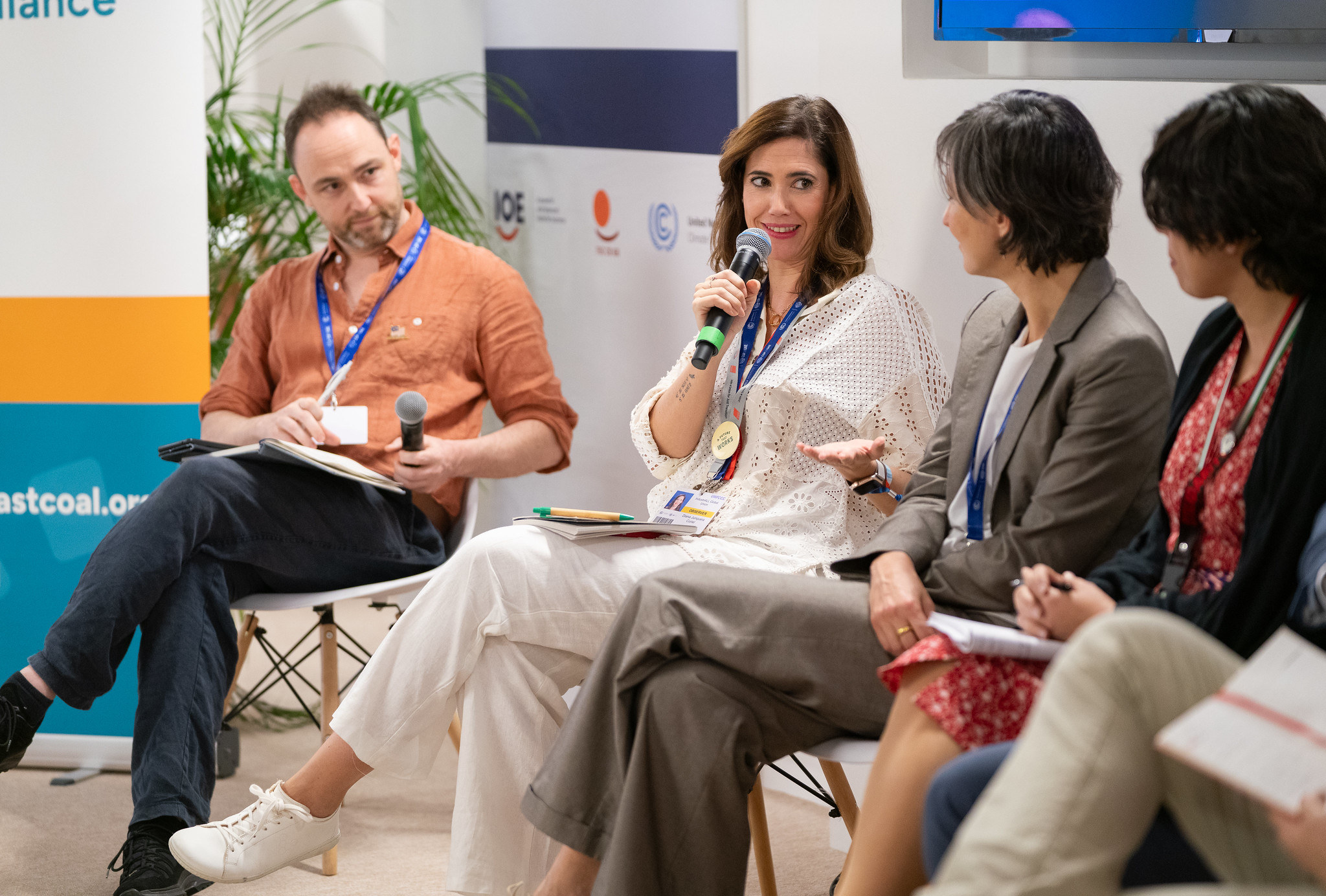

Q: How do you balance the potential for just transition with the threat of green extractivism and continued reliance on an extractivist model?
Felipe: “Firstly, a very careful selection of locations needs to happen; this means excluding sensitive regions like the Amazon, but others that, under conditions, are aiming to develop an industrial base to produce all the goods and technologies needed for the transition could be options. The priority is also to avoid only exporting raw materials, as has been the case so far. On the second dimension of justice, we have a problem too, especially with such short administrations of only 4-year periods, it is very hard to operationalise that. So we have to work on proxies: who gets transition projects, who is involved, who benefits from them. Our central initiative, which exemplifies how we are trying to address this issue, is promoting energy communities. That is our biggest bet on how to bring ownership, participation, and local appropriation of the energy transition to the territories.”
Anabella: “The preconception that all developing countries and countries in the Global South have to offer more extraction is a problem. We have to find a different pathway. This is about our access to water and access to land, but also what our role is in the big division of labour. Is it just about extraction? On this, it’s very important to engage with the EU and the developed countries to a certain extent. Because, so far, our only invitation to join the global community is through more extraction. There is a need to figure out what adding to the value chain means for us. It’s a massive conversation that is growing, and we are expecting to see this discussed as part of a just transition conversation.”
Camilla: “Unfortunately, this is still an uncomfortable conversation. It’s a big blind spot. We call them clean transition minerals, but they’re not very clean in social and labour terms. There are still very big decent work deficits when it comes to fundamental principles and rights at work in many energy transition mineral mining regions, which is essential to address. The international community, instead of shying away from it, should put a stronger focus on this. A second aspect is that we also need to think long term. How are we using revenue from this mining? In the past, we’ve been quite short-sighted on this. How can we diversify local economies and put the mining revenues to best use? How can we share those revenues with the local communities that are bearing the brunt by having those mines in their local areas? Here Indigenous People are key. Going forward, energy minerals need to be front and centre of just energy transition discussions.”
Q: One glaring hole in the just transition knowledge base is: How do we systematically evaluate and assess progress towards the justice dimension? How can we measure that the money is relieving injustices? It will be super important to sustain political support for just transition initiatives. If we can’t show it’s actually working, we’ll run out of support.
Anabella: “We are working on figuring out a collective assessment of JETPs and trying to find the dimensions in which we want the JETPs to be evaluated. Ultimately, we would like to see minimum standards for just transition and guidance on how we can measure progress as potential outcomes of the JTWP to start building that governance. But that would only come once some deep work and conversation happens within the process.”
Camilla: “Now there is a stronger focus on implementation of just transition and tracking implementation, which is essential. This also needs to be tied to accountability. It’s not just about governments monitoring their own progress, it’s about unions, industry, and civil society being able to see what’s done, but it also has to be country driven, because there needs to be specificity, and local stakeholders need to own what progress means. There should be both process and outcome indicators, as this transition will take time, and we need to be able to track progress as we move forward.”
Diana: “On indicators and follow up, we shouldn’t be ticking boxes. In Indonesia, we know our workers are at the table, but only to tick a box. They are not part of the consultation; they are there, but their comments are not taken into account. So this is really needed, in, for example, the processes of the JETPs, which are the best ways to diversify this economy and give access to everyone.”
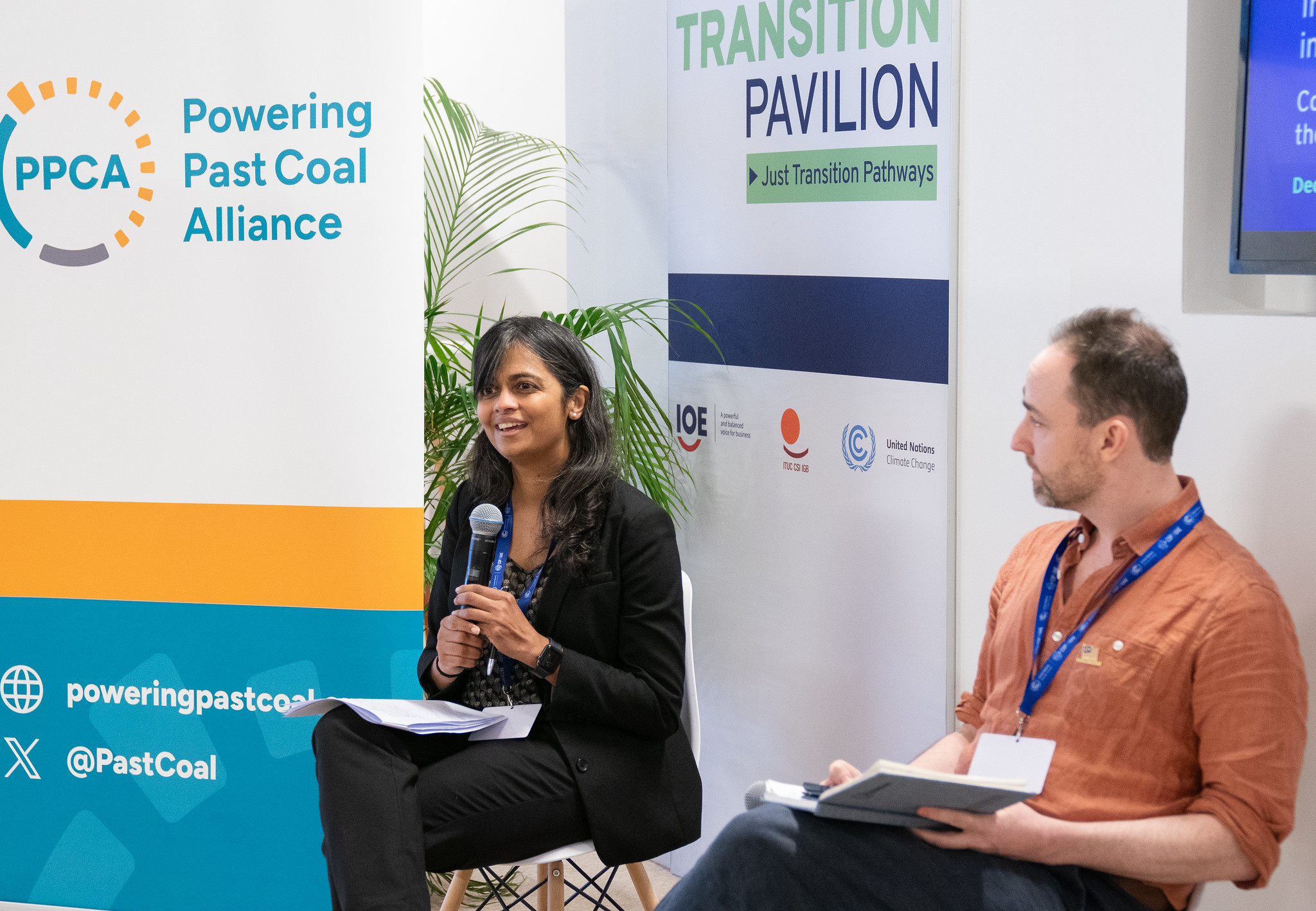

Binnu Jeyakumar Senior Advisor, Powering Past Coal Alliance (PPCA):
“Just transition is a key condition and enabler of ambitious climate action. We heard many of the implementation challenges that a lot of the regions are facing, particularly what Felipe and Anabella shared around economic diversification that needs to happen in regions that have developed around fossil fuels. We need to bring in new economic models that don’t build on the same economic inequities of fossil fuel extraction that have happened so far. We have regions where human rights are still being abused, so there are lots of challenges. The panel made a really good case for why we need to come together to overcome these challenges and why we need to enable the exchange of knowledge.
PPCA has 180 members: a quarter of national governments in the world and also subnational governments in the most coal-dependent countries, such as the Philippines and South Korea; we also have financial institutions and utility companies. Together, they have a remarkable reservoir of resources, experience, and influence. And as we get more members in more coal-dependent regions, we find it’s critical to be able to share this expertise. But we know expertise sharing is not enough. We need a budget, we need access to finance. The PPCA has been working on the Coal Transition Accelerator with the French and German governments. We want to work with partners and stakeholders to develop this and not repeat the mistakes of other financing mechanisms, and be complementary to those that already exist.”
Chris Beaton Director, Energy Program, IISD
“There are three big takeaways in terms of how we go forward from here. Firstly, partnerships are crucial. There is a wealth of knowledge to be shared to make progress in the area of just transition. Secondly, those partnerships do need to be built on the right foundations. For the IKI JET project, it’s very important that these conversations are based on the ILO just transition guidelines and that they involve tripartite processes and the appropriate social dialogue. Lastly, country contexts are very important. We heard that today through the different experiences from Colombia and Indonesia. These differences make these exchanges so valuable. They give us the chance to identify common ground, learn from each other and make progress together.”
Read our full analysis: Just Transition at COP 28: How much progress was actually made?
Receive updates on just energy transition news, insights, knowledge, and events directly in your inbox.